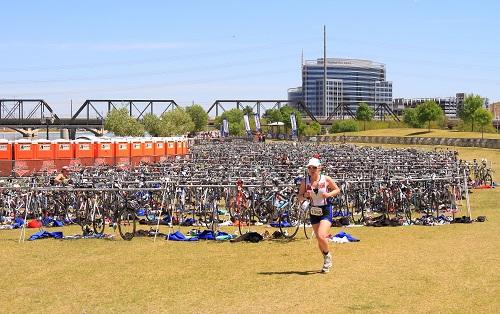

All 12 full-distance IRONMAN events slated for 2021 — from the Memorial Hermann IRONMAN Texas on April 24 to IRONMAN Arizona on Nov. 21 — are sold out. In April, USA Triathlon announced that the Toyota USA Triathlon Age Group Sprint and Olympic-Distance National Championships in Milwaukee are sold out, too. Officials expect more than 5,200 participants from all 50 states and Washington, D.C., to compete in Brew City from Aug. 6-8.
“It is an exciting time for our sport, and it is great that IRONMAN athletes are eager to be racing in 2021,” Elizabeth O’Brien, Managing Director of North America for The IRONMAN Group, told endurance.biz in December.
The website noted that many IRONMAN events sold out quickly, including Visit Panama City Beach IRONMAN Florida in two days. IRONMAN California in Sacramento, new to the circuit this year, sold out in one day, and IRONMAN Arizona sold out during the presale period.
Such positive developments suggest not only a commitment on the part of destinations, race organizers and participants to regain some sense of normalcy, but they also indicate — after a year of quarantining and training solo — that athletes are itching to get out and compete with their peers. Signing up for a tri, a marathon or even a local 5K gives them a new goal to pursue.
At the same time, open-water swimming is enjoying a huge surge in popularity. With many pools closed for most of last year and part of this year, people turned to lakes, rivers and other natural bodies of water for training.
All of this is not say that organizers are throwing caution to the wind as the number of COVID-19 cases fall in some states and more people receive their vaccine shots. The Toyota Age Group National Championships will be held with stringent COVID-19 safety precautions in place as part of USA Triathlon’s Safe Return to Multisport initiative. The national governing body notes that participants should expect the following safety measures to be in place in Milwaukee:
• Self-screening before arrival at the venue
• Temperature checks upon arrival at the venue
• Limited spectator capacity
• Contact reduction for all athletes, staff and volunteers
• Pre-race briefings held virtually instead of in-person
• Masks worn by all individuals at all times except when actively racing
• Increased cleaning and disinfecting practices onsite, including hand sanitizer stations throughout
• Increased spacing between athletes in transition area and at swim start
• Smaller wave sizes
• Bottled water at aid stations
• Limited aid stations; athletes are encouraged to race with their own nutrition
• Signage throughout the venue reminding athletes to wear masks and remain six feet apart whenever possible
Triathlon’s resurgence coincides with USA Triathlon’s new “Elevate 2028,” a seven-year strategic plan unveiled in March designed to help guide the organization’s priorities, decision-making processes and culture through the next two Olympic and Paralympic Quadrennials.
“The goals outlined within the Elevate 2028 Strategic Plan are ambitious, but the USA Triathlon Board of Directors has full faith in USA Triathlon and the entire multisport community to make them a reality,” Joel Rosinbum, President of the USA Triathlon Board of Director, said in a statement. He added that Elevate 2028 is intentionally designed through 2028 “to mark the moment when the Summer Olympic and Paralympic Games return to the United States — to Southern California, the birthplace of triathlon — for the first time in 32 years.”
The LA 2028 Games will mark the first time triathlon is contested in the Olympic and Paralympic Games on U.S. soil. Triathlon was added to both programs in 2000.
To build Elevate 2028, USA Triathlon assembled a working group representing the sport’s key constituent groups (coaches, race directors, clubs and officials), age group and elite athletes, endurance sports brands, thought leaders in sport, the USA Triathlon Board of Directors and executive staff. In addition, representatives from the U.S. Olympic & Paralympic Committee collaborated and facilitated conversations to ensure USA Triathlon’s strategic priorities are aligned with its own mission and vision.
Elevate 2028 is rooted in four guiding principles: excellence; service; diversity, equity, inclusion and access; and collaboration. These guideposts will allow the organization to allocate time and resources to directly benefit the sport and its participants, help shape the culture of USA Triathlon, and inform the day-to-day work of its staff and volunteer leadership. Each guiding principle is explained in more detail in a video message from members of USA Triathlon’s executive leadership team.
“The steps we take now are critical to laying the foundation for what USA Triathlon and the sport can achieve in the long term,” added USA Triathlon Chief Executive Officer Rocky Harris. “We are dedicated to growing the sport and serving its participants in new and innovative ways. We are energized by the potential that lies before us.”

